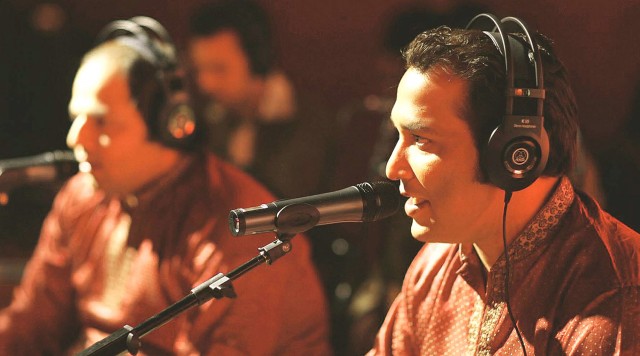
But the issue of cover songs has been a sensitive one in Pakistan. While bands like Junoon managed to make it work with its cover of “Lal Meri Pat”, the crop of cover songs in the past two decades has been largely disappointing.
Atif Aslam’s version of Junoon’s “Dosti”, and the two songs on Coke Studio’s second episode, “Bolo Bolo”, (originally by Sajjad Ali, covered by EP) and “Aisha” (originally by Khaled, covered by Amanat Ali) have received negative reviews online.
EP’s version in particular has come in for the most flak. While the band was able to deliver a rollicking version of the song when they first formed, the Coke Studio performance was nasal, overtly anglicised and screechy, with none of the fun feel that the Sajjad Ali version had to it.
“Aisha”, on the other hand, fared better because the original structure of the song wasn’t changed up as much as “Bolo Bolo”.
Unsurprisingly, the other cover, “Ni Saiyon Asa Naina Te Akhay” was one of the most popular songs from the second episode, but that was because it was delivered by qawwals, Rizwan and Moazzam, from Nusrat Fateh Ali Khan’s family, whose powerful voices only served to recall Khan’s legacy.
But do the bad reviews mean Pakistanis are just not ready to listen to recent pop history being paid tribute to?
Not necessarily. As with “Lal Meri Pat”, Pakistani singers have a long history of reworking the classics. Junoon used Sufi kalams and Allama Iqbal’s poetry and Zeb and Haniya have performed reworked versions of folk tunes that have become hits.
“What musicians should do,” singer Irfan Khan says, “is to take songs that have not been as popular.” Covering iconic songs is not a mantle that any band or singer should scurry to pick up. The comparisons between the cover songs and the originals will consistently favour the original party. This is why none of the versions done of the national anthem have become as popular as the original, sung by school children in assemblies countrywide.
Published in The Express Tribune, June 28th, 2010.

















COMMENTS (5)
Comments are moderated and generally will be posted if they are on-topic and not abusive.
For more information, please see our Comments FAQ